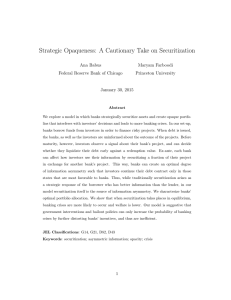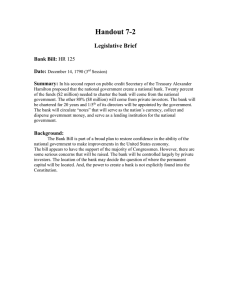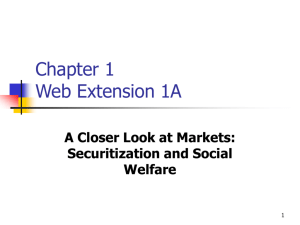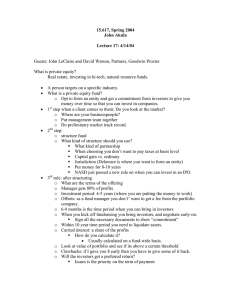DEAL AGENT: NEW GOVERNANCE AND OVERSIGHT RECOMMENDED FOR RMBS LAS VEGAS
advertisement
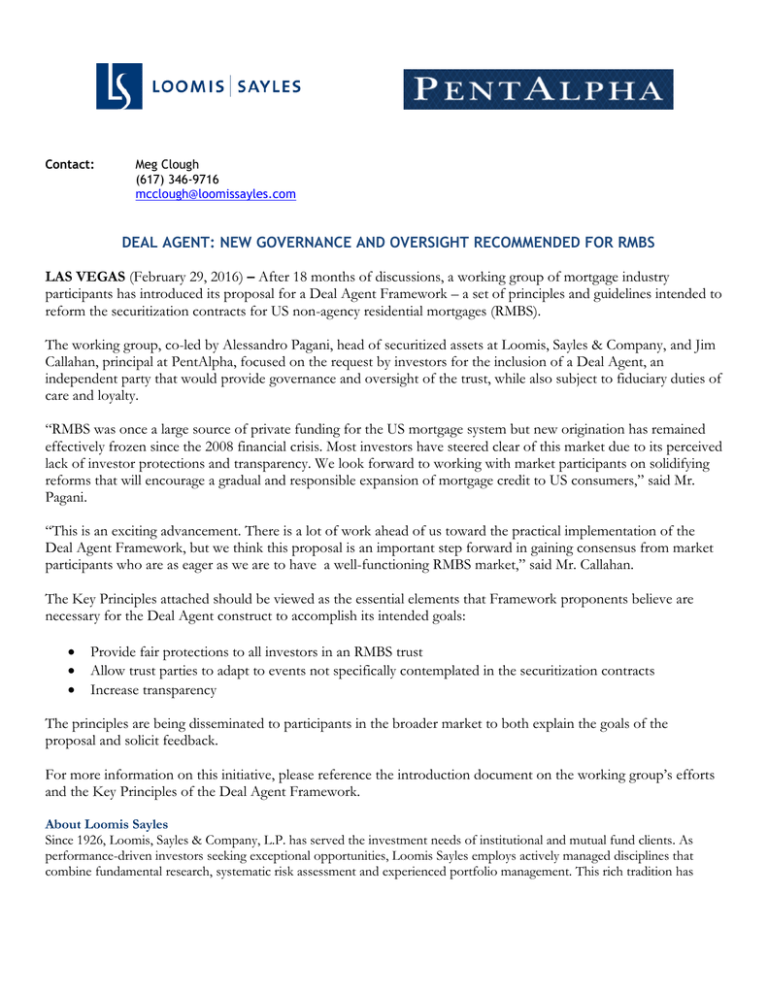
Contact: Meg Clough (617) 346-9716 mcclough@loomissayles.com DEAL AGENT: NEW GOVERNANCE AND OVERSIGHT RECOMMENDED FOR RMBS LAS VEGAS (February 29, 2016) – After 18 months of discussions, a working group of mortgage industry participants has introduced its proposal for a Deal Agent Framework – a set of principles and guidelines intended to reform the securitization contracts for US non-agency residential mortgages (RMBS). The working group, co-led by Alessandro Pagani, head of securitized assets at Loomis, Sayles & Company, and Jim Callahan, principal at PentAlpha, focused on the request by investors for the inclusion of a Deal Agent, an independent party that would provide governance and oversight of the trust, while also subject to fiduciary duties of care and loyalty. “RMBS was once a large source of private funding for the US mortgage system but new origination has remained effectively frozen since the 2008 financial crisis. Most investors have steered clear of this market due to its perceived lack of investor protections and transparency. We look forward to working with market participants on solidifying reforms that will encourage a gradual and responsible expansion of mortgage credit to US consumers,” said Mr. Pagani. “This is an exciting advancement. There is a lot of work ahead of us toward the practical implementation of the Deal Agent Framework, but we think this proposal is an important step forward in gaining consensus from market participants who are as eager as we are to have a well-functioning RMBS market,” said Mr. Callahan. The Key Principles attached should be viewed as the essential elements that Framework proponents believe are necessary for the Deal Agent construct to accomplish its intended goals: Provide fair protections to all investors in an RMBS trust Allow trust parties to adapt to events not specifically contemplated in the securitization contracts Increase transparency The principles are being disseminated to participants in the broader market to both explain the goals of the proposal and solicit feedback. For more information on this initiative, please reference the introduction document on the working group’s efforts and the Key Principles of the Deal Agent Framework. About Loomis Sayles Since 1926, Loomis, Sayles & Company, L.P. has served the investment needs of institutional and mutual fund clients. As performance-driven investors seeking exceptional opportunities, Loomis Sayles employs actively managed disciplines that combine fundamental research, systematic risk assessment and experienced portfolio management. This rich tradition has earned Loomis Sayles the trust and respect of clients worldwide, for whom it manages $229 billion in assets as of December 31, 2015. About PentAlpha Founded in the early 1990's, PentAlpha is considered an industry-leading workout firm dedicated to repairing damaged financial institutions and the debt instruments they issue. The firm is staffed with former investment banking and finance company traders, bankers, quantitative analysts and operations specialists with loan origination and loan collections expertise. The firm specializes in European and US interests. MALR014744 February 25, 2016 Proposed Deal Agent Framework: Background and Introduction Prior to the 2008 financial crisis, the US non-agency residential mortgage (RMBS) market had over $2.5 trillion dollars outstanding and was a key source of private capital for the US mortgage system. The new origination RMBS market has remained effectively closed since 2008 and, while many factors may have contributed, numerous investors cite serious deficiencies within existing RMBS transactions for their lack of engagement in the new issue market. The “Deal Agent Framework” is a proposal to reform the securitization contracts for U.S. RMBS transactions in a manner that we believe would significantly enhance the governance protocols built into the current U.S. RMBS structures. This proposal is based on over 18 months of discussions facilitated by the U.S. Department of Treasury (“Treasury”) under its “Private Label Securitization (PLS) Initiative”. The Treasury’s PLS Initiative provided a forum for a large number of industry participants (investors, mortgage originators and aggregators, mortgage servicers, trustees, potential Deal Agents and rating agencies) to address several topics, including: servicer oversight, representations & warranties enforcement and the role of the trustee. Over time, a substantial portion of the group's conversations focused closely on the request by investor representatives for the inclusion in the trust of an independent party (the “Deal Agent”) that would represent the interests of all investors in the trust, subject to robust and continuous fiduciary duties of care and loyalty. The resulting Deal Agent Framework, crafted and supported by many PLS Initiative participants, aims to improve RMBS transactions by ensuring that all parties to the securitization contracts fulfill their contractual obligations, and are subject to the oversight of an entity empowered with enforcement authority in the event such party determines events of non-compliance. This key new entity, the Deal Agent, would be a party to the securitization contracts, act in a fiduciary-like capacity to maximize the value of trust assets, and have the authority (either directly or through direction to the trustee) to enforce these contracts on behalf of all investors. While some of the Deal Agent’s functions were previously assigned to other entities within the trust, many investors have concluded that their interests would be best protected by entrusting the governance of the trust primarily to a party that is subject to fiduciary duties of care and loyalty. In addition to enforcing the existing contractual responsibilities of the trust parties, the Deal Agent would be authorized to act on behalf of all investors to negotiate amendments to the securitization contracts. This would allow the trust to adapt to unforeseen events in order to protect the best interests of all investors. This is a major enhancement from current securitization structures, where the amendment process is extremely difficult and faces the Page 1 of 3 February 25, 2016 hurdles of a special purpose vehicle that has historically been designed to be passive and is hampered by conflicts of interest and significant operational challenges posed by the requirement for bondholder voting. Various provisions were discussed to ensure that the Deal Agent performed its role in a balanced fashion. We are publicly releasing the “Key Principles of the Deal Agent Framework” to explain the goals of the proposal, disseminate it to participants in the broader market, and solicit feedback from additional parties. The Key Principles attached should be viewed as the essential elements that Framework proponents believe are necessary for the Deal Agent construct to accomplish its intended goals: provide fair protections to all investors in the trust; allow trust parties to adapt to events not specifically contemplated in the securitization contracts; increase transparency into those actions. On behalf of the Framework’s proponents, we hope that issuers and other transaction parties will consider these goals as they design new RMBS transactions. Should they incorporate the proposed Framework, we believe that many influential and impactful investors will be encouraged to re-engage in what would amount to a significantly reformed new issue U.S. RMBS market. Thank you to Treasury for facilitating and encouraging open dialogue across many parties with sometimes diverging interests. Thank you to all the participants in the working group who have shared their deep and diverse experiences and put in countless hours of work toward the shared goal of improving and reforming the structure of RMBS. While the proposed Deal Agent Framework has been extensively debated and we believe it has gained acceptance among many active participants in the working group, particularly among investors, we do not represent that a unanimous consensus has yet been achieved. We expect the dialogue that gave rise to the proposed Framework will continue among proponents and those who are still considering or support alternative constructs. In addition, we believe the proposed Deal Agent Framework is complementary to the efforts by Structured Finance Industry Group's RMBS 3.0 Task Force and to the fiduciary model advanced by the Association of Institutional INVESTORS. We therefore encourage RMBS 3.0 participants to evaluate the proposed Framework as they continue their work toward the goals we share. Additional work is necessary toward the practical implementation of the Deal Agent Framework, particularly the enhancement of the underlying securitization contracts to allow the Deal Agent to perform its duties to the required standard of care and loyalty. Furthermore, Page 2 of 3 February 25, 2016 securitization economics are impacted by factors that are beyond the control of securitization practitioners, and these challenges may delay the Framework’s implementation. However, along with other proponents, we firmly believe that the eventual implementation of the proposed Deal Agent Framework is a condition necessary for meaningful, sustainable private funding returning to the U.S. RMBS market and for a gradual and responsible expansion of mortgage credit to U.S. consumers. Sincerely, Co-Chairs of the Deal Agent Committee1 Alessandro Pagani Head of Securitized Assets Loomis Sayles & Company 1 James Callahan Principal Pentalpha Global The Deal Agent Committee refers to an informal working group of industry representatives, who have participated in a series of discussions facilitated by the US Treasury as part of its Private Label Securitization (PLS) Initiative. In facilitating discussions related to the PLS Initiative, Treasury did not and does not seek advice or recommendations for any federal government policy, decision, or activity. The proposed Deal Agent Framework and Key Principles may not represent the views of all the participants in the US Treasury’s PLS Initiative. Page 3 of 3 Proposed Deal Agent Agreement: Key Principles February 25, 2016 Deal Agent Agreement—Key Principles Deal Agent Adds New Governance and Oversight Role for RMBS Trusts The role of the Deal Agent is analogous to that of a Board of Directors, in that the Deal Agent has high-level oversight of the other parties that act on behalf of the trust, coupled with a robust continuous fiduciary duty. The Deal Agent will be charged with protecting the interests of the RMBS trust, maximizing the net present value of its assets and making certain strategic decisions in the limited circumstances that doing so becomes necessary. Consistent with this governance role, the Deal Agent’s duties are a combination of prescribed and open-ended—i.e., including but not limited to specific tasks--within the categories described below. Deal Agent as Fiduciary Duty of care: the obligation of the Deal Agent to act with the care an ordinarily prudent person in a like position would exercise under similar circumstances to maximize the value of the Loans and any other Trust assets and to otherwise protect the interests of the Trust, as if it were acting on its own behalf. Duty of loyalty: the obligation of the Deal Agent to act solely on behalf of the Trust without regard to its own self-interest, to exercise its judgment and discretion in a manner it reasonably believes to be in the best interests of the Trust and to avoid conflicts of interest and/or self-dealing. The duty of loyalty includes the duties of good faith and fair dealing. The Deal Agent would not place the interests of any class above those of any other class, and there would be no directing class or controlling class. Investors would be able to communicate with the Deal Agent, but would not generally have authority to direct the Deal Agent. The Deal Agent may be guided by a vote of all bondholders in very specific situations. Review and Oversight Functions Review of representations and warranties Certain trigger events will cause the Deal Agent to determine whether to review a Loan to evaluate whether a breach of any representation or warranty has Proposed Deal Agent Agreement: Key Principles February 25, 2016 occurred with respect to the Loan. Deal Agent will be permitted to use its own judgment in considering whether to conduct the review. Deal Agent will have authority to obtain all information necessary to undertake such evaluation (including credit files, servicing files, underwriting guidelines, etc.) and enforce repurchase demands. Review of servicer compliance Deal Agent will supervise each servicer to ensure that the servicers are focused on maximizing the value of the assets and that there is no self-dealing. Review is intended to be procedures-based, rather than outcomes based (i.e., the Deal Agent would review whether the servicer was complying with its own articulated standards and those set forth in the transaction documents, rather than attempting to determine whether better outcomes could have been achieved). Deal Agent would have authority to evaluate breaches of servicing obligations, and in appropriate circumstances to pursue claims against the servicer and/or terminate the servicer. Deal Agent would be expected to ensure that all cash flows under the transaction would be reconciled on a monthly basis.1 Reporting Deal Agent would report its findings and review status related to its performance of services on a monthly basis. The Deal Agent will share the reported information with all bondholders. Indemnification 1 Deal Agent would be protected, either through Trust indemnification or through an alternative means if agreed by the parties, from liability so long as it has acted in accordance with its duties of care and loyalty. Bondholders will be able to sue and remove the Deal Agent if it fails to act in accordance with its duties of care and loyalty. Note: This continues to be under discussion, including as to the practical logistics of such reconciliation and the role of the master servicer. Proposed Deal Agent Agreement: Key Principles February 25, 2016 Deal Agent would be liable for gross negligence or willful misconduct, and will be expected to comply with all privacy laws relating to non-public personal consumer information. The Deal Agent framework will be enforced through arbitration whenever possible to reduce legal costs to the Trust and the Deal Agent.

